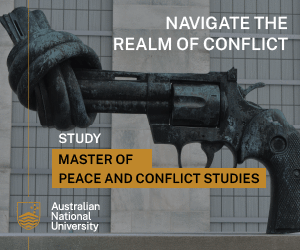Better Poverty Reduction in Global Governance?
This paper will evaluate and analyse the poverty alleviation strategies manifested by the World Bank, United Nations Development Programme (UNDP), and the International Monetary Fund (IMF), explaining how they have converged over time. With the use of case studies it will argue that, whilst it might seem that the convergence has benefited poverty reduction, this is in fact not the case.
Is U.S. Power in Decline?
Sceptics of soft power proclaim that as long as the United States is strong enough, it can do what it wishes and thus “the world’s only superpower does not need permanent allies.” Nevertheless in light of the difficulties in Iraq and Afghanistan as well as the decline in the American economy following the fall of the loan market and “fewer genuine friends surrounding it”, one has to ask the question of whether or not US power is in decline.
The Dilemma of Cosmopolitanism and State Sovereignty
The international system, comprised as it is of a society of sovereign states, necessarily stands as a barrier to universal morality. The ideal of cosmopolitanism, envisioning humanity as a singular and unified moral community, is impossible in a world where the primary political unit is the state.
The American Way of War: Time for Change
American aversion to counterinsurgency is deeply ingrained in the American way of warfare. Since the 1940s the US Army has trained, equipped, and organised for large-scale conventional operations against like adversaries. They have traditionally employed conventional military operations even against irregular enemies. I hope to show that America’s conventional supremacy and in particular their approach to war may prove to be counterproductive in this new century of small wars.
“In less developed countries politics and not mineral endowments is at the root of violent conflict”. Discuss.
In looking at the cases of Angola, Indonesia and Zaire it can be clearly demonstrated that though minerals are of significance they are only so because of political decisions. The discussion begins with an evaluation of the ‘resource curse’ argument looking closely at its empirical grounding and two main explanatory models: rent seeking and the rentier state. The robustness of this analysis is then questioned and the relationship of mineral resources and politics to the root of violent conflict is assessed through the use of detailed case studies.
The British Invasion of Egypt, 1882
Liberal fire-brand William Gladstone launched his election campaign to become British Prime Minister in 1880 during what was being described by contemporaries as the ‘Great Depression’. The ‘People’s William’ was elected primarily on the back of his promise to reverse the Conservative Party’s jingoistic, imperialist foreign policy under Benjamin Disraeli’s tenure.
Should the (or a) Purpose of IR Theory be to Promote Better Futures?
Theory can never be detached from situational context. Far from even contemplating the possibility of bias-free analysis, I argue that any knowledge claim must always be inherently political in nature, capable of stimulating or withholding change in the social context in which the claimant is embedded. If this (admittedly divisive) assumption is correct, it seems the theorist, including the IR theorist, has two somewhat polar options. He can concentrate on and develop theory that ‘leads to analysis that is pro-status quo and amoral’, or alternatively he can concentrate on the critical evaluation of how we come to see a certain range of possibilities in the international arena.
Venezuela’s Threats to U.S. Economic Security
The United States is currently feeling the pinch when it comes to purchasing oil. Though there is research being done to find alternative measures, until then, the United States must continue to purchase oil abroad. One of its main exporters is Venezuela. Hugo Chavez, president of Venezuela, since coming to office has made it a point to undermine the United States and its influence in the Latin American region. Is there a possibility that Venezuela could potentially stop its oil exports to the United States?
“The Most Successful Developing Economies Are Characterised By Greater Trade Openness.” Discuss
This paper agrees with the opinion that trade is an essential tool, which helps developing economies industrialise. However by using case studies, empirical data and analysing the adopted polices of the successful developing economies, this paper will support the argument that the most successful developing economies, developed under a more protectionist environment. Having completed this evaluation, the paper will then look at the policy implications of the conclusions made.
‘The October Russian Revolution and the 1944-8 takeovers in Central and Eastern Europe demonstrate that war is the decisive factor in the success of communist takeovers’ Discuss.
In October 1917, the Bolshevik Party staged the first communist revolution in history. With this, the new Russian leadership removed Russia from the Great War and began to put into action its ideological ideas for world revolution. In 1919 the Third Communist International (Comintern) was established with the role of exporting the revolution and creating, a ‘World Federative Republic of Soviets’ which was seen as crucial for the survival of the Russian soviet state. Despite this, and the economic problems of the interwar years, the only other country to witness a communist revolution before the Second World War was Outer Mongolia (and briefly, Hungary).





